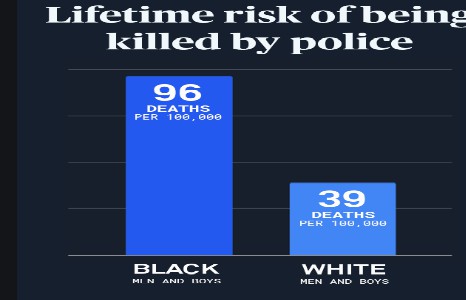[Police Violence]
Rutgers University-Newark study: “The disproportionate killing of Black suspects is a police problem, not a white police problem.”
Photo: PBS screenshot
Rutgers University-Newark study: Police violence is a leading cause of death among young Black men.
A 2019 School of Criminal Justice study by lead author Frank Edwards, assistant professor in the School of Criminal Justice at Rutgers University-Newark, found that police use of fatal force is a leading cause of death in young men in the United States – with Black men 2.5 times more likely to be killed by law enforcement over their lifetime than white men.
The study, published in PNAS, Proceedings of the National Academy of Sciences, examined fatality risks during police encounters – some 11,456 between 2013-2017 – and found that African-American men and women, American Indian/Alaska Native men and women and Latino men face a higher lifetime risk of being killed by police than do their white peers.
The multiple killings of unarmed Black men – including George Floyd – by white police officers across the nation have many asking: Do white law enforcement officers target minority suspects? An extensive, 2018 national study from the School of Public Affairs and Administration Dean Charles Menifield at Rutgers University-Newark reveals some surprising answers.
- African-Americans are killed by police more than twice as often as the general population.
- The disproportionate killing of Black suspects is a police problem, not a white police problem.
“There might be some bad apples in the police department, but white officers are no more likely to use lethal force against minorities than nonwhite officers,” says Menifield. “Still, the killings are no less racist but will require a very different set of remedies if we are to change the culture and stop this from happening … This unfortunate state of affairs is unlikely to improve until fundamental changes in public policy and policing are undertaken.”






